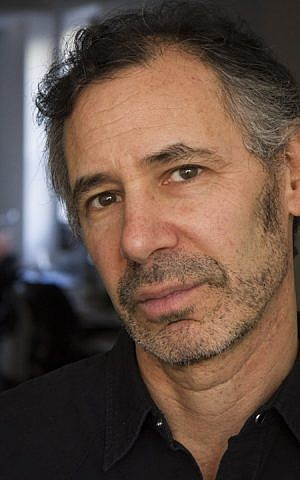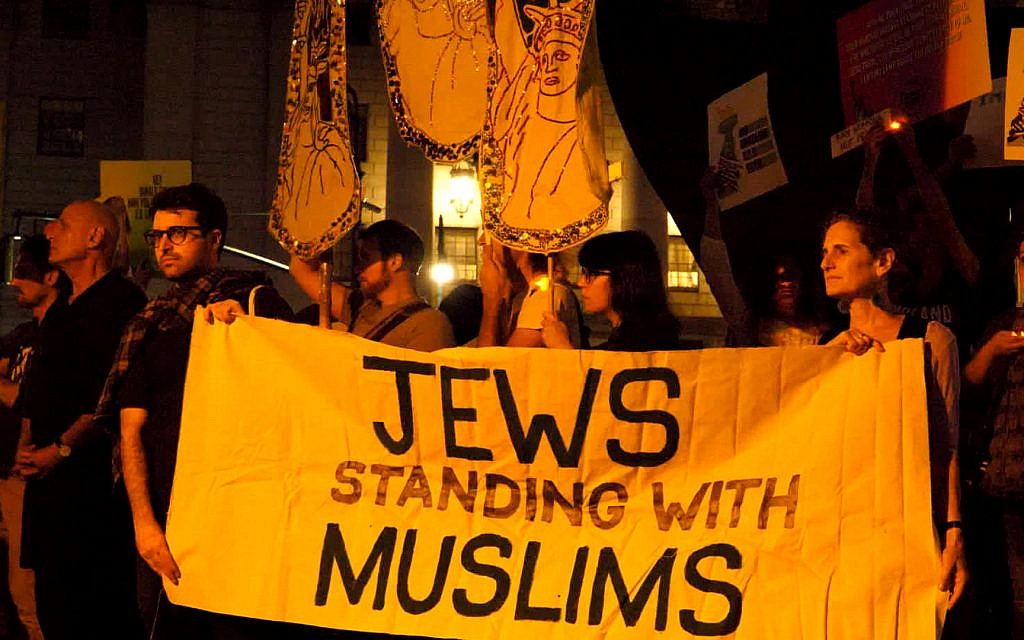Galvanized by the president’s travel ban, director Adam Zucker challenges US citizens to stand up to racism against Muslims in a recent documentary.
For the last two-and-a-half years, congregants and clergy from Rabbi Sharon Kleinbaum’s synagogue, Congregation Beit Simchat Torah, have shown up every Friday in front of the Islamic Center at NYU in Manhattan. With warm smiles and holding handwritten signs sporting “Shalom/Salaam,” Kleinbaum and friends greet Muslim worshipers arriving for the afternoon prayers. “It’s about the power of being an ally,” Kleinbaum says with regard to the interfaith work the synagogue has undertaken with the neighboring mosque.
This alliance is only one example of Jewish-Muslim solidarity shown in Adam Zucker’s new documentary film, “American Muslim,” premiering at the San Francisco Jewish Film Festival. The film focuses on the experiences of American Muslims in the Trump era. The film challenges Americans of all faiths or no faith to consider how they are standing up (or not) for those targeted by increasing xenophobia and racism, which has been linked by some to the current administration’s rhetoric and immigration policies.
Director Zucker said his own way of responding to his disappointment at Trump’s election was to pick up his camera and make a film that would introduce viewers to Muslims, about whom the president had made numerous controversial statements during his campaign. For this new project, Zucker set about profiling a handful of American-Muslim New Yorkers of different backgrounds, genders and ages. Finding subjects for the film wasn’t so easy, given that the 61-year-old Jew didn’t know any American Muslims. “New York has a very large Muslim population, and I am a lifelong New Yorker, but I hadn’t really met any Muslims,” Zucker admitted.
According to Zucker, the fact that he is Jewish did not at all bother the people he interviewed and filmed.
“Virtually every American Muslim I spoke to was glad I was there documenting their story. People felt a need to open up, and working on this film opened up for me an unfamiliar world that profoundly moved me,” Zucker said.
Zucker found the framework for his film on January 27, 2017, when Trump signed a controversial executive order effectively targeting Muslim migrants. Zucker documented protests against the ban and tracked the trajectory of legal challenges to it.
It was important to Zucker to reflect the diversity of the American Muslim community, and to dispel misconceptions. More than once, subjects of the film bemoan the fact that many Americans incorrectly think that all Muslims are Arabs, and that all Arabs are Muslims. In fact, most Arabs in the US are Christian.
The film introduces audiences to Dr. Debbie Almontaser, a veteran Yemenite-American educator and activist, and a longtime partner to Kleinbaum in interfaith efforts. Another community activist, Aber Kawas, a young Palestinian-American woman, campaigns for a Palestinian-American priest running for local government. Another featured personality is Mohamed Bahi, a young Algerian-American who founded Muslims ‘Giving Back’, an organization that runs a variety of charity and social programs for residents of the local community Muslims and non-Muslims alike.
The film often emphasizes that unlike post-9/11, American Muslims can now rely on a network of partnerships with interfaith, pro-immigration, and social justice groups to fight the Muslim Ban. Zucker noted that the support is mutual. After the October 27, 2018 massacre at the Tree of Life synagogue in Pittsburgh, Muslims he met while making the film reached out to him.



COMMENTS